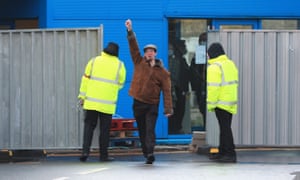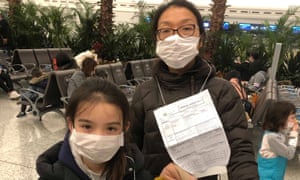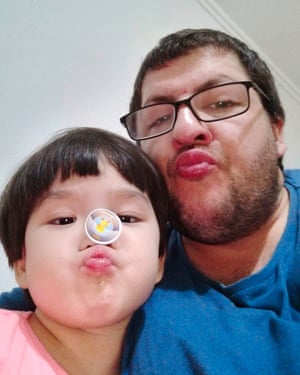- Joined
- Feb 26, 2019
- Messages
- 12,449
- Points
- 113
Britons evacuated from Wuhan regret coming home | World news
www.theguardian.com

Like many of the Britons who were evacuated from Wuhan, the centre of the coronavirus pandemic, it was a difficult journey for Anthony May-Smith, involving a frantic last-minute dash to the airport through the locked down city in January.
All those repatriated from Wuhan underwent two weeks of quarantine in the Wirral, and after a brief stint of normality, May-Smith is now back in lockdown, wishing he had stayed put in China.
“It’s just really weird, getting thrown back into it,” the 26-year-old from Lichfield said.
He never imagined that the UK would end up in a lockdown: “It just makes you think, all the hassle that we went through to come back, was it really worth it?”

Facebook Twitter Pinterest
Anthony May-Smith and his girlfriend Yenny. Photograph: Handout
He was in Wuhan visiting his girlfriend, Yenny, and had been offered a job teaching English there. Now he’s working as a truck driver and regularly sleeps in his vehicle to avoid the risk of infecting his grandparents at home.
“Looking at it now, I wish I hadn’t come back,” he said. “I would be coming out of lockdown now, and instead I’m just going into one.”
He’s not alone. Fellow evacuee Matt Raw, 38, is enjoying life in lockdown in Knutsford, but said if he’d known how bad the outbreak was going to get in Britain, he would have stayed in China.
“It feels a little bit like out of the pot, into the fire,” said Raw, who was living in Wuhan with his wife, Ying, and 75-year-old mother, Hazel, who suffers from dementia. “We made the wrong decision coming back here. We should have stayed in China.”
He said the UK was “slow to act” and he was surprised the UK didn’t quarantine people flying into the country. “I just sat watching the news incredulously every single day. What was the point of putting us in quarantine?”
He said he feels lucky to be living through lockdown in a spacious house with a garden, adding that his home in Wuhan was more cramped, and like many inner-city apartments in China, had little natural light.
“We made our decision based on the best information available at the time. Hindsight is a wonderful thing.” he said. “Yes, I wish we’d stayed there. But by the same token, it’s also nice to be back over here again.”

Facebook Twitter Pinterest
Sindy Siddle and nine-year-old daughter Jasmine in a picture taken by Jeff Siddle as they left China to escape Coronavirus Photograph: Siddle family
Jeff and Sindy Siddle, now in lockdown in Prudoe, Northumberland, also questioned whether leaving Wuhan had been the best course of action, but decided that – despite their nightmare journey – it was the best thing to do.

“Overall I think we still made the right decision, but certainly we have asked the question,” said Jeff.
The couple, along with their 10-year-old daughter, Jasmine, had been visiting Sindy’s family in a village in Hubei province, three hours drive from Wuhan, when the lockdown took effect.
“Here, we can stay at home, we can do our jobs no problem,” said Sindy, an accounting assistant. “And Jasmine can do her school work. Back in Wuhan I was worried about her being the only one off school for a long time, but now all the kids are off, so I’m much more relaxed.”
The one positive to come out of their Wuhan ordeal is their preparedness for the outbreak over here. “I think we are probably more cautious than a lot of the people in the UK because we’ve been through it before,” said Jeff.

Facebook Twitter Pinterest
Chris Hill with his four-year-old daughter Renee Gao. Photograph: Family Handout/PA
“We’ve been much more worried about it and we go out a lot less than our friends and family. We’re so worried we don’t go out beyond the garden, other than to the supermarket once a week, and we do click and collect to avoid going in.”
The family originally faced being split apart, when Sindy was told she wouldn’t be allowed on the UK repatriation flight as she had a Chinese passport.
Chris Hill, another Briton out in Wuhan, faced a similar problem after the Foreign Office was unable to confirm whether his wife and four-year-old daughter, both Chinese nationals, would be able to join him on the flight home.
He decided to stay put.
“I made the choice to stay because I didn’t want to risk leaving them,” said the 38-year-old from Sunderland, who has lived in Wuhan for 12 years and works as an English language teacher. “I did falter a couple of times and I would start having regrets. But I knew the lockdown wouldn’t last forever.”
After nearly 76 days stuck inside, and tight restrictions on movement still in place, he’s confident he was better off in China. “I’m still glad I made the decision to stay,” he said.
Since you’re here...
… we’re asking readers like you to make a contribution in support of our open, independent journalism. In these frightening and uncertain times, the expertise, scientific knowledge and careful judgment in our reporting has never been so vital. No matter how unpredictable the future feels, we will remain with you, delivering high quality news so we can all make critical decisions about our lives, health and security. Together we can find a way through this.
We believe every one of us deserves equal access to accurate news and calm explanation. So, unlike many others, we made a different choice: to keep Guardian journalism open for all, regardless of where they live or what they can afford to pay. This would not be possible without the generosity of readers, who now support our work from 180 countries around the world.
We have upheld our editorial independence in the face of the disintegration of traditional media – with social platforms giving rise to misinformation, the seemingly unstoppable rise of big tech and independent voices being squashed by commercial ownership. The Guardian’s independence means we can set our own agenda and voice our own opinions. Our journalism is free from commercial and political bias – never influenced by billionaire owners or shareholders. This makes us different. It means we can challenge the powerful without fear and give a voice to those less heard.
Your financial support has meant we can keep investigating, disentangling and interrogating. It has protected our independence, which has never been so critical. We are so grateful.
We need your support so we can keep delivering quality journalism that’s open and independent. And that is here for the long term. Every reader contribution, however big or small, is so valuable. Support the Guardian from as little as $1 – and it only takes a minute. Thank you.
www.theguardian.com

Like many of the Britons who were evacuated from Wuhan, the centre of the coronavirus pandemic, it was a difficult journey for Anthony May-Smith, involving a frantic last-minute dash to the airport through the locked down city in January.
All those repatriated from Wuhan underwent two weeks of quarantine in the Wirral, and after a brief stint of normality, May-Smith is now back in lockdown, wishing he had stayed put in China.
“It’s just really weird, getting thrown back into it,” the 26-year-old from Lichfield said.
He never imagined that the UK would end up in a lockdown: “It just makes you think, all the hassle that we went through to come back, was it really worth it?”

Facebook Twitter Pinterest
Anthony May-Smith and his girlfriend Yenny. Photograph: Handout
He was in Wuhan visiting his girlfriend, Yenny, and had been offered a job teaching English there. Now he’s working as a truck driver and regularly sleeps in his vehicle to avoid the risk of infecting his grandparents at home.
“Looking at it now, I wish I hadn’t come back,” he said. “I would be coming out of lockdown now, and instead I’m just going into one.”
He’s not alone. Fellow evacuee Matt Raw, 38, is enjoying life in lockdown in Knutsford, but said if he’d known how bad the outbreak was going to get in Britain, he would have stayed in China.
“It feels a little bit like out of the pot, into the fire,” said Raw, who was living in Wuhan with his wife, Ying, and 75-year-old mother, Hazel, who suffers from dementia. “We made the wrong decision coming back here. We should have stayed in China.”
He said the UK was “slow to act” and he was surprised the UK didn’t quarantine people flying into the country. “I just sat watching the news incredulously every single day. What was the point of putting us in quarantine?”
He said he feels lucky to be living through lockdown in a spacious house with a garden, adding that his home in Wuhan was more cramped, and like many inner-city apartments in China, had little natural light.
“We made our decision based on the best information available at the time. Hindsight is a wonderful thing.” he said. “Yes, I wish we’d stayed there. But by the same token, it’s also nice to be back over here again.”

Facebook Twitter Pinterest
Sindy Siddle and nine-year-old daughter Jasmine in a picture taken by Jeff Siddle as they left China to escape Coronavirus Photograph: Siddle family
Jeff and Sindy Siddle, now in lockdown in Prudoe, Northumberland, also questioned whether leaving Wuhan had been the best course of action, but decided that – despite their nightmare journey – it was the best thing to do.

“Overall I think we still made the right decision, but certainly we have asked the question,” said Jeff.
The couple, along with their 10-year-old daughter, Jasmine, had been visiting Sindy’s family in a village in Hubei province, three hours drive from Wuhan, when the lockdown took effect.
“Here, we can stay at home, we can do our jobs no problem,” said Sindy, an accounting assistant. “And Jasmine can do her school work. Back in Wuhan I was worried about her being the only one off school for a long time, but now all the kids are off, so I’m much more relaxed.”
The one positive to come out of their Wuhan ordeal is their preparedness for the outbreak over here. “I think we are probably more cautious than a lot of the people in the UK because we’ve been through it before,” said Jeff.

Facebook Twitter Pinterest
Chris Hill with his four-year-old daughter Renee Gao. Photograph: Family Handout/PA
“We’ve been much more worried about it and we go out a lot less than our friends and family. We’re so worried we don’t go out beyond the garden, other than to the supermarket once a week, and we do click and collect to avoid going in.”
The family originally faced being split apart, when Sindy was told she wouldn’t be allowed on the UK repatriation flight as she had a Chinese passport.
Chris Hill, another Briton out in Wuhan, faced a similar problem after the Foreign Office was unable to confirm whether his wife and four-year-old daughter, both Chinese nationals, would be able to join him on the flight home.
He decided to stay put.
“I made the choice to stay because I didn’t want to risk leaving them,” said the 38-year-old from Sunderland, who has lived in Wuhan for 12 years and works as an English language teacher. “I did falter a couple of times and I would start having regrets. But I knew the lockdown wouldn’t last forever.”
After nearly 76 days stuck inside, and tight restrictions on movement still in place, he’s confident he was better off in China. “I’m still glad I made the decision to stay,” he said.
Since you’re here...
… we’re asking readers like you to make a contribution in support of our open, independent journalism. In these frightening and uncertain times, the expertise, scientific knowledge and careful judgment in our reporting has never been so vital. No matter how unpredictable the future feels, we will remain with you, delivering high quality news so we can all make critical decisions about our lives, health and security. Together we can find a way through this.
We believe every one of us deserves equal access to accurate news and calm explanation. So, unlike many others, we made a different choice: to keep Guardian journalism open for all, regardless of where they live or what they can afford to pay. This would not be possible without the generosity of readers, who now support our work from 180 countries around the world.
We have upheld our editorial independence in the face of the disintegration of traditional media – with social platforms giving rise to misinformation, the seemingly unstoppable rise of big tech and independent voices being squashed by commercial ownership. The Guardian’s independence means we can set our own agenda and voice our own opinions. Our journalism is free from commercial and political bias – never influenced by billionaire owners or shareholders. This makes us different. It means we can challenge the powerful without fear and give a voice to those less heard.
Your financial support has meant we can keep investigating, disentangling and interrogating. It has protected our independence, which has never been so critical. We are so grateful.
We need your support so we can keep delivering quality journalism that’s open and independent. And that is here for the long term. Every reader contribution, however big or small, is so valuable. Support the Guardian from as little as $1 – and it only takes a minute. Thank you.
